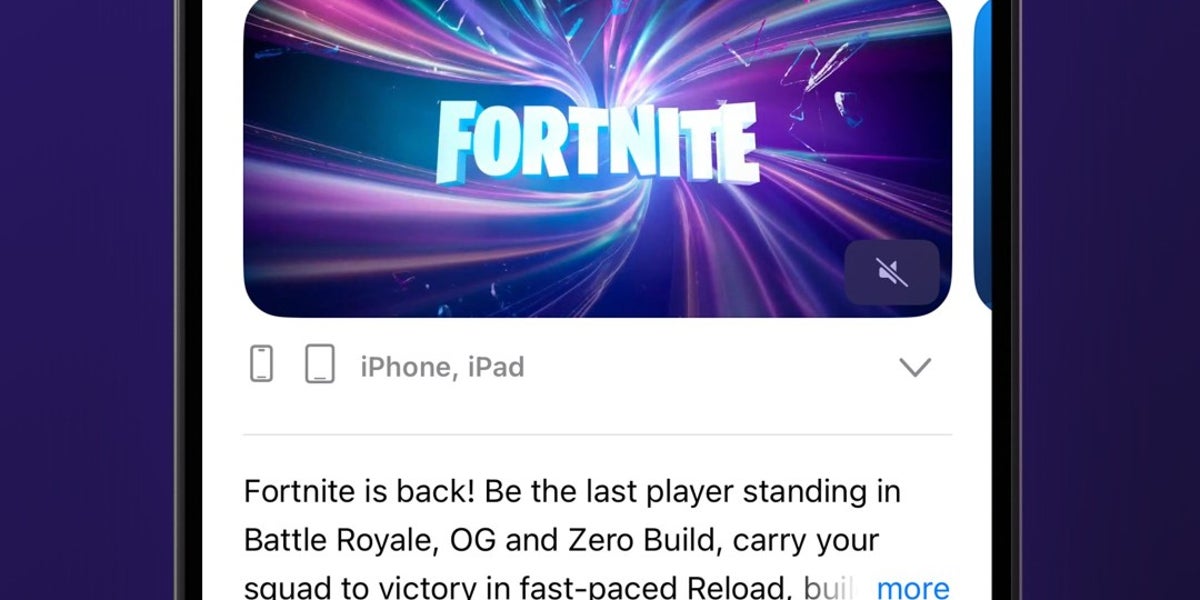Fortnite’s Triumphant Return to iOS in the US and Europe: A Detailed Analysis
After a protracted legal battle that spanned nearly five years, Fortnite has finally made its return to iOS devices in the United States and Europe. This marks a significant victory for Epic Games and a potential shift in the power dynamics within the mobile gaming industry. The game’s re-emergence on Apple’s platform follows a ruling against Apple regarding its App Store policies, specifically concerning alternative payment methods. This report delves into the circumstances surrounding Fortnite’s return, the legal intricacies of the Epic Games v. Apple case, and the broader implications for the future of app distribution and developer autonomy.
The Genesis of the Conflict: A Battle Over Revenue
The conflict between Epic Games and Apple began in August 2020 when Epic Games implemented a direct payment system within Fortnite, bypassing Apple’s mandatory In-App Purchase (IAP) system. Apple’s IAP system requires developers to use Apple’s payment infrastructure, which takes a 30% commission on all transactions. Epic Games argued that this commission was anti-competitive and stifled innovation by limiting developers’ ability to offer competitive pricing or directly engage with their customers.
In response to Epic’s circumvention of the IAP system, Apple removed Fortnite from the App Store, effectively cutting off access to millions of iOS users. Epic Games retaliated by filing a lawsuit against Apple, alleging anti-competitive practices and violations of antitrust laws. This legal battle quickly escalated, drawing attention from regulators, industry observers, and developers who shared concerns about Apple’s control over the App Store ecosystem.
Legal Wrangling and Judicial Intervention
The Epic Games v. Apple case went to trial in 2021, with both sides presenting extensive arguments and evidence. The court ruled primarily in Apple’s favor, finding that the company was not a monopolist under antitrust laws. However, the judge also issued an injunction that prohibited Apple from preventing developers from directing users to alternative payment methods outside of the App Store.
Despite this injunction, Apple continued to resist implementing changes that would significantly alter its App Store policies. Epic Games accused Apple of non-compliance, arguing that Apple’s proposed solutions, such as charging a 27% commission on alternative payments, were designed to discourage developers and maintain its control over the App Store ecosystem.
Earlier this month, Judge Yvonne Gonzales Rogers found Apple in contempt of court for its attempts to block apps offering alternative payment methods. This ruling signaled a turning point in the legal battle, indicating that the court was losing patience with Apple’s resistance to change.
Fortnite’s Re-emergence: A Victory for Epic Games
Following the court’s ruling, Epic Games announced the return of Fortnite to iOS devices in the United States and Europe. In the US, the game is available for download directly from the App Store. In the European Union, users can access Fortnite through the Epic Games Store and AltStore PAL, alternative app marketplaces that have emerged as a result of the Digital Markets Act (DMA).
The return of Fortnite to iOS marks a significant victory for Epic Games, restoring access to a large and valuable user base. It also represents a symbolic triumph over Apple, demonstrating that even the tech giant is subject to legal and regulatory constraints.
Implications for the App Store Ecosystem
The Fortnite saga has far-reaching implications for the future of the App Store ecosystem and the broader mobile gaming industry. The case has brought greater scrutiny to Apple’s App Store policies, raising questions about the fairness of its commission structure and its control over app distribution.
The emergence of alternative app marketplaces in Europe, driven by the DMA, presents a challenge to Apple’s dominance and offers developers greater choice in how they reach their audience. These alternative marketplaces could foster greater competition and innovation, potentially leading to lower prices for consumers and more favorable terms for developers.
The legal battle between Epic Games and Apple has also emboldened other developers to challenge Apple’s App Store policies. Several lawsuits and regulatory investigations are underway, targeting Apple’s alleged anti-competitive practices.
The Road Ahead: Uncertainties and Opportunities
While Fortnite’s return to iOS is a positive development for Epic Games and a potential catalyst for change in the App Store ecosystem, uncertainties remain. Apple is likely to continue defending its App Store policies and may seek to appeal the court’s rulings. The long-term impact of alternative app marketplaces on the App Store ecosystem is also uncertain.
Despite these uncertainties, the Fortnite saga has opened up new opportunities for developers and consumers. Developers now have more options for distributing their apps and reaching their audience, while consumers may benefit from lower prices and greater choice.
Conclusion: A New Chapter in the App Store Story
The return of Fortnite to iOS in the US and Europe marks the beginning of a new chapter in the App Store story. The legal battle between Epic Games and Apple has exposed the flaws in the current App Store ecosystem and paved the way for greater competition and innovation. As the mobile gaming industry continues to evolve, it is essential that regulators and policymakers ensure a level playing field for all developers and that consumers have access to a diverse range of choices. The “game over” for the Apple Tax may be closer than ever.

